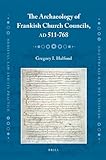Archaeology of Frankish Church Councils, AD 511-768 / by Gregory I. Halfond.
Material type: TextSeries: Medieval law and its practice ; v. 6.Publisher: Leiden ; Boston : Brill, 2010Description: 1 online resource (ix, 299 pages) : mapContent type:
TextSeries: Medieval law and its practice ; v. 6.Publisher: Leiden ; Boston : Brill, 2010Description: 1 online resource (ix, 299 pages) : mapContent type: - 9789047444060
- 904744406X
- 9789004179769
- 9004179763
- 262/.524409021 22
- BR200 .H35 2010eb
- online - EBSCO
| Item type | Current library | Call number | URL | Status | Notes | Barcode | |
|---|---|---|---|---|---|---|---|
 eBook
eBook
|
Biblioteca "Angelicum" Pont. Univ. S.Tommaso d'Aquino Nuvola online | online - EBSCO (Browse shelf(Opens below)) | Online access | Not for loan (Accesso limitato) | Accesso per gli utenti autorizzati / Access for authorized users | (ebsco)338679 |
Includes bibliographical references and index.
Preface -- Abbreviations and note on translations -- Introduction: A Roman institution in a post-Roman world -- Sources of conciliar history -- The physical world of the frankish councils -- The reflection of reality in conciliar legislation -- The enforcement of conciliar rulings -- From councils to canon law -- Continuity and change in the eighth century -- Conclusion -- Appendices -- A. Frankish Councils, 511-768 -- B. Contested and Dubious Councils, 511-768 -- Calendar of councils -- Map (ecclesiastical provinces and bishoprics of Merovingian Gaul) -- Bibliography -- Index.
Print version record.
Despite growing scepticism concerning the evidentiary value of normative legal sources, scholars continue to mine the legislative acts of ecclesiastical councils for insight into political, religious, and quotidian life in Frankish Gaul. Between the reigns of Clovis and Charlemagne (AD 511-768) at least eighty councils assembled, often on royal command, to discuss issues of concern to the episcopal and clerical attendees. Their published canons were intended to communicate ecclesiastical policy in the Frankish regnum. However, scholars have paid comparatively slight attention to the institution responsible for this body of legislation. This book remedies this lacuna by delineating the functions and modus operandi of the Frankish church council as an administrative body. -- Provided by publisher.


